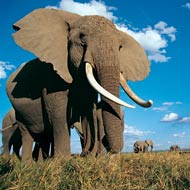
Findings could inform management of wild elephant populations
An analysis of freeze-dried dung has given scientists new insights into the effect of stress on elephants.
The study, published in Conservation Physiology, demonstrates that the physical body condition of elephants is season-dependent - particularly in females - and that this change is reflected in their glucocorticoid metabolite levels.
Researchers say their findings could contribute to the welfare, conservation and management of wild elephant populations.
‘Our study is among the first to explore the influence of seasonality on BCS [Body Condition Score] and its relationship to stress status (as determined by measuring cortisol levels) in a free-ranging elephant population,’ the authors write.
Faecal glucocorticoid metabolite (FGM) analysis is a non-invasive method used to study the effect of stress in animals.
Animals such as elephants are subjected to a variety of stressors in their lives, such as drought, food shortages, threats from predators and illness. During stressful events, their bodies secrete hormones called glucocorticoids into the blood which are eventually broken down into metabolites and excreted from the body.
In the study, researchers collected some 300 samples of dung from 261 elephants in the Western Ghats, a mountain range that runs parallel to the west coast of India. The researchers then freeze-dried the samples to preserve the elephants’ hormones.
Their analysis revealed that the elephants experienced higher stress levels during the dry season when resources were low. They also came to the conclusion that a poor body condition was a good visual indicator of stress.
Speaking to BBC News, senior researcher Prof Raman Sukumar said: "In a natural environment, large and long-ranging herbivorous mammals such as elephants may have to face various ecological challenges or stressful conditions.
“One such challenge that might impact their health is forage resource limitation, either in terms of quality or quantity."
He added that higher amounts of glucocorticoids suggested that the animal was more stressed. "Stress levels in female elephants were more conspicuous than in male elephants," he said.



 The BSAVA has opened submissions for the BSAVA Clinical Research Abstracts 2026.
The BSAVA has opened submissions for the BSAVA Clinical Research Abstracts 2026.